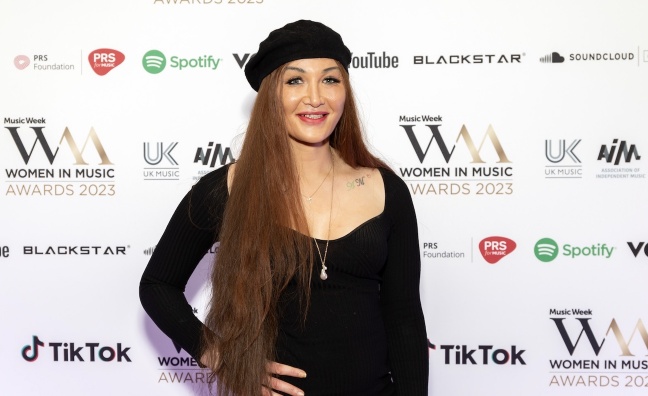Later this month, Music Week’s 2023 Women In Music Roll Of Honour inductee Saskhia Menendez will be giving a talk at Chris Carey’s Fast Forward (FFWD) event in London. She will be speaking on the topic of Misogyny In Music alongside songwriter, producer and founder of PeakMusicUK and The Unheard Campaign, Eve Horne.
With over 10 years experience in the music industry, Menendez is an equality and diversity ambassador, researcher, public speaker, artist, mentor and social change activist. She is a part of Keychange, on the board of directors for The F List Music and is a LIVE Diversity Expert panel member.
In the lead up to her speech at the FFWD conference, Menendez shares her experiences as a trans woman building a career in the music industry, how the business can better support the trans community and what really goes into being an ally...
WORDS: SASKHIA MENENDEZ
Progressing in the music industry comes with many benefits, but it also brings with it unique challenges, depending on what kind of community and background you come from.
My aim in this article is to share some of the experiences and barriers I have faced as a multi-racial trans woman from a disadvantaged background, when accessing and developing in the UK music industry. I am going to look at the strategies and techniques of overcoming issues as they arise, as well as how to be a better ally and advocate.
I cannot write for all trans people because there is not just one average transgender experience. We are all coming from different starting places and we all have our own experiences and challenges. However, I am hoping that this helps others to understand some of the issues that I and others face as well as enlighten those on how to better support the trans community.
Being in an underrepresented and disadvantaged community can be difficult when building a sustainable career with meaning and purpose. In my work, I must build meaningful relationships that are based on shared values and goals, which takes time and dedication on both a professional and personal level. Educating others is also very important as it helps people outside my community understand and learn; it keeps others informed of what issues I personally face, but also reminds people that each person in the trans community has their own set of unique personal barriers and challenges.
These challenges differ depending on your gender, how 'passable' you are, how long since you have transitioned and how confident you come across.
The music industry is a highly competitive and complex business to create a career in, there are constant changes – political, legal and technological – occurring as it continually evolves and diversifies. You must be authentic and represent yourself, your community and work constantly to build relationships, reputation and trust. There are also many conflicting needs and interests, all of which need to be dealt with in a positive and constructive way.
You need to be driven and highly focused, with a positive outlook. You have to believe in yourself and trust the process, because there will be ups and downs. Networking and meeting new people I find always helps, as it changes perceptions and helps build meaningful relationships. Showing dedication and passion for the work you do, along with helping others to understand it, is also crucial for change.
There are also financial barriers, especially for people who don’t live at home with parents. This can often make it again harder to get a job that can cover outgoings and rent, particularly in light of the cost-of-living crisis. Being able to prioritise my time effectively has really helped me, as well as attending some networking events online and in person.
To summarise the above, building a successful career in the music industry demands dedication, adaptability and a proactive mindset. By implementing these strategic approaches, you position yourself for sustained growth and success in this ever-evolving field.
Being an ally is an ongoing process of learning, listening and taking positive action. It's important for allies to adapt their approach based on the evolving needs and experiences of the trans community within the music business.
Here are three examples of how to be a great ally in the music industry:
First of all, people can boost the visibility of trans musicians by featuring them in interviews, playlists, and social media. By actively supporting and sharing trans musicians’ work you can help to create a more inclusive music community.
Secondly, allies should advocate for inclusive hiring practices and equal opportunities for trans individuals in the music industry. Encouraging organisations to adopt and enforce inclusive policies contributes to a more supportive environment.
And finally, as an ally, you can play a crucial role in educating yourself and others about the challenges faced by trans professionals in music. By sharing information, challenging stereotypes and promoting inclusivity, you can contribute to a more understanding and supportive industry.
You have to be approachable, be kind and also understand that no one is at the same starting position when it comes to acceptance, understanding or empathy. Some people will take longer than others. Change is uncomfortable for some, but it is something I can guarantee happens all the time in this fact-paced environment of the music industry.
FFWD Conference will be taking place on February 13 and 14, tickets available now.











